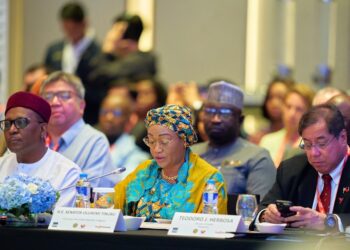•By Olayinka Falola
Minimum wage refers to the legally mandated minimum amount of compensation that employers are required to pay their workers for a specified period of work. It is intended to ensure that workers receive a fair and minimum standard of living, providing them with adequate income to meet their basic needs such as food, shelter, clothing, and healthcare. In Nigeria, minimum wage policies are established and regulated by the government through legislation and regulations. The minimum wage is typically set at a level that is deemed sufficient to cover the basic needs of workers and their families, taking into account factors such as inflation, cost of living, and prevailing economic conditions.
Nigeria is currently facing significant economic challenges, with the falling value of the Naira and a rapid decline in purchasing power. These issues have exacerbated the plight of ordinary citizens, making it increasingly difficult for them to afford basic necessities. In response to this crisis, President Bola Tinubu has recently established a minimum wage committee, tasked with proposing a new minimum wage that reflects the current economic realities. However, in order to truly address the root causes of the economic downturn and stimulate growth, it is imperative that the committee considers the concept of a living wage, which takes into account the actual cost of living for Nigerian workers and transition towards a living wage to ensure a decent standard of living for all Nigerians.
The Decline of the Naira and Purchasing Power:
The Naira, has experienced a steady decline in value over the years. This depreciation has been fueled by various factors, including dwindling oil revenues, high inflation rates, and external economic pressures. As a result, the purchasing power of the average Nigerian has significantly diminished, making it increasingly challenging to afford basic goods and services.
Historical Perspective on Minimum Wage:
The concept of minimum wage in Nigeria dates back to the colonial era, with the introduction of the Native Authority Ordinance of 1936, which established minimum wage rates for certain categories of workers. Since then, minimum wage laws have evolved, with periodic revisions to adjust for inflation and changing economic conditions. However, the gap between the minimum wage and the actual cost of living has widened over time, leaving many workers struggling to make ends meet.
The Case for a Living Wage:
A living wage differs from a minimum wage in that it is calculated based on the actual cost of living in a given area, taking into account factors such as housing, food, transportation, healthcare, and education. Unlike the minimum wage, which often falls short of providing a decent standard of living, a living wage ensures that workers can afford basic necessities without having to rely on government assistance or multiple jobs.
Proposal for a Living Wage:
In light of Nigeria’s current economic challenges, the minimum wage committee should consider proposing a living wage as a sustainable solution to address the plight of Nigerian workers. By establishing a wage floor that reflects the true cost of living, the government can help alleviate poverty, reduce income inequality, and stimulate consumer spending, thereby driving economic growth.
Decentralization of Minimum Wage Laws:
In Nigeria, the setting of minimum wage involves both the federal government and subnational entities, such as state governments. While the federal government establishes a national minimum wage that applies to all workers in the country, including those in states, subnational entities have roles in the process and may choose to implement different minimum wage rates within their jurisdictions. Below are the roles of subnational entities in fixing minimum wage and reasons why different states may opt for varying minimum wage rates hence states should be allowed to make their own Labour Laws and set their own minimum for the following reasons :
i. Autonomy in Labour Matters: State governments have a degree of autonomy in labour-related matters, including setting minimum wage rates within their respective states. This autonomy allows states to consider local economic conditions, cost of living, and other factors unique to their regions when determining minimum wage levels.
ii. Cost of Living Disparities: Different states in Nigeria often have varying costs of living due to differences in urbanization, infrastructure, housing costs, and other socio-economic factors. For example, urban areas like Lagos may have higher living costs compared to rural areas in some northern states. Therefore, allowing states to set their minimum wage rates enables them to address the disparities in the cost of living and ensure that workers can afford basic necessities based on local conditions.
iii. Economic Considerations: Subnational entities may have different economic conditions, levels of development, and revenue generation capacities. For instance, states with stronger economies or higher internally generated revenue may be better positioned to afford higher minimum wage rates without significant strain on businesses or government finances. Conversely, states facing economic challenges or resource constraints may need to set lower minimum wage rates to balance economic viability and labour welfare.
iv. Flexibility and Responsiveness: Granting states the flexibility to set their minimum wage rates allows them to respond more effectively to local economic dynamics, labor market conditions, and socio-economic challenges. This flexibility enables states to tailor minimum wage policies to suit the needs and realities of their respective populations, fostering better outcomes for workers and businesses alike.
v. Promoting Competition and Growth: Permitting states to determine their minimum wage rates can promote healthy competition and economic growth. It incentivizes states to adopt policies that attract investment, stimulate job creation, and enhance productivity, leading to overall improvements in living standards and economic prosperity.
The Role of the Private Sector:
In addition to government intervention, the private sector also has a crucial role to play in ensuring fair wages for workers. Employers should be encouraged to adopt living wage policies voluntarily, recognizing that investing in their workforce not only improves employee morale and productivity but also contributes to long-term business success.
Conclusion:
As the minimum wage committee embarks on its mandate to propose a new minimum wage for Nigeria, it is essential that they adopt a holistic approach that takes into account the economic realities facing ordinary citizens. By advocating for a living wage, the committee has the opportunity to address the root causes of poverty and inequality, while also laying the foundation for a more inclusive and prosperous economy for all Nigerians. It is time to prioritize the well-being of workers and ensure that no one is left behind in Nigeria’s journey towards economic development and prosperity.
 •Olayinka Falola (O’FALZ)
•Olayinka Falola (O’FALZ)
drotem99@gmail.com
Alimosho, Lagos, Nigeria.





















